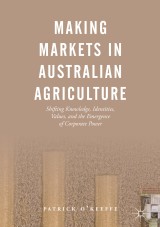Details

Making Markets in Australian Agriculture
Shifting Knowledge, Identities, Values, and the Emergence of Corporate Power|
CHF 118.00 |
|
| Verlag: | Palgrave Macmillan |
| Format: | |
| Veröffentl.: | 21.01.2019 |
| ISBN/EAN: | 9789811335198 |
| Sprache: | englisch |
Dieses eBook enthält ein Wasserzeichen.
Beschreibungen
<div><div><div>This book provides a genealogical study of Australian agricultural restructuring, focusing on the case study of wheat export market deregulation. This policy shift was implemented in 2008, ending 60 years of statutory wheat marketing. At the time, policy makers claimed that market liberalisation would empower individual growers, providing them with choice and freedom through uninhibited participation in markets. However, regional wheat markets have become concentrated, and are increasingly controlled by a small number of transnational agribusiness firms, which have been increasingly active in setting the policy agenda in Australian agriculture. </div><div><br></div><div>The book delves into the discursive construction of policy truths such as efficiency, competition, and the consumer, to understand how this shift was made possible, whose interests have been served, and what the implications of this shift have been. This book focuses on the machinations which contributed to this shift by examining the construction of knowledge, values and identities, which have helped to make the transition from the public to the private appear as a logical, common sense solution to the challenges facing Australian agriculture. </div><div><br></div><div>The author shows how governmental technologies such as audit, cost-benefit analysis, performance objectives and the consumer were used to make this reality operable. In doing so, he argues that this shift should be viewed as part of the broader restructuring of Australian society, which has facilitated the transference of economic and policy making power from the public to the private.</div></div></div>
1. Making Markets: Agricultural restructuring in Australia.- 2. Governmentality as a lens for analysing agricultural restructuring in Australia.- 3. Creating a reality of markets, firms and consumers.- 4. Productivism, financialisation and the ‘good farmer’: Constructing a rational, governable farming sector.- 5. Acting on society: Quantification, technologies of performance and erasure of ‘the social’.- 6. Freedom and choice? Legitimising concentration in deregulated agricultural markets.- 7. Feeding the world or turning a profit? How transnational agribusiness firms use discourse to shape their external environments.- 8. Constructing a corporate society: Shaping knowledge, identities and values to facilitate the emergence of corporate power.
<b>Patrick O’Keeffe</b> completed his PhD research at RMIT University in 2018. Patrick’s research has been published by the following peer reviewed journals: <i>Agriculture and Human Values</i>, <i>Space and Polity</i>, <i>Australian Geographer</i>, <i>Journal of Sociology</i>, <i>Rural Society and Journal of Australian Political Economy</i>. Patrick is a lecturer at the RMIT University's School of Global, Urban and Social Studies.
<div>This book provides a genealogical study of Australian agricultural restructuring, focusing on the case study of wheat export market deregulation. This policy shift was implemented in 2008, ending 60 years of statutory wheat marketing. At the time, policy makers claimed that market liberalisation would empower individual growers, providing them with choice and freedom through uninhibited participation in markets. However, regional wheat markets have become concentrated, and are increasingly controlled by a small number of transnational agribusiness firms, which have been increasingly active in setting the policy agenda in Australian agriculture. </div><div><br></div><div>The book delves into the discursive construction of policy truths such as efficiency, competition, and the consumer, to understand how this shift was made possible, whose interests have been served, and what the implications of this shift have been. This book focuses on the machinations which contributedto this shift by examining the construction of knowledge, values and identities, which have helped to make the transition from the public to the private appear as a logical, common sense solution to the challenges facing Australian agriculture. </div><div><br></div><div>The author shows how governmental technologies such as audit, cost-benefit analysis, performance objectives and the consumer were used to make this reality operable. In doing so, he argues that this shift should be viewed as part of the broader restructuring of Australian society, which has facilitated the transference of economic and policy making power from the public to the private.<br></div><div><br></div><div><b>Patrick O’Keeffe</b> completed his PhD research at RMIT University in 2018. Patrick’s research has been published by the following peer reviewed journals: <i>Agriculture and Human Values</i>, <i>Space and Polity</i>, <i>Australian Geographer</i>, <i>Journal of Sociology</i>, <i>Rural Society and Journal of Australian Political Economy</i>. Patrick is a lecturer at the RMIT University's School of Global, Urban and Social Studies.<br></div>
Analyses wheat export market deregulation in Australia Highlights how regional wheat markets have become concentrated, and controlled by transnational agribusiness firms Examines the construction of knowledge, values and identities to show how machinations contributed to deregulation appearing as the most logical solution Shows how governmental technologies were used to make the shift towards liberalisation of the wheat export market happen
<div><div>Analyses wheat export market deregulation in Australia</div><div><br></div><div>Highlights how regional wheat markets have become concentrated, and controlled by transnational agribusiness firms</div><div><br></div><div>Examines the construction of knowledge, values and identities to show how machinations contributed to deregulation appearing as the most logical solution</div><div><br></div><div>Shows how governmental technologies were used to make the shift towards liberalisation of the wheat export market happen</div></div><div><br></div>
Diese Produkte könnten Sie auch interessieren:

Agricultural Biodiversity and Biotechnology in Economic Development

von: Joseph Cooper, Leslie Lipper, David Zilberman

CHF 236.00

Policy Reforms and Agriculture Development in Central Asia

von: Sandjar Djalalov, Suresh Chandra Babu

CHF 236.00

Regulating Agricultural Biotechnology

von: Richard E. Just, Julian M. Alston, David Zilberman

CHF 236.00













